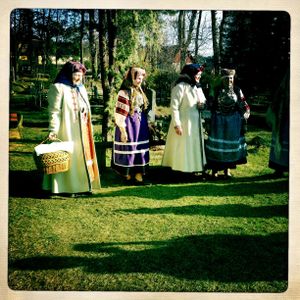Lesson from Estonia: Love feeds us all
(Photo by Cheryl-Anne Millsap)
Living in villages in the remote southeastern corner of Estonia, the Setu people have been farmers and woodsmen for centuries. No one seems to be exactly sure how long. They are said to be the oldest settled people in Europe, having never moved from their homeland. The pagan traditions of the past melded over time with the traditions of the Russian Orthodox Church and now, with half their homeland on the Soviet side of the demarcation line drawn after Estonian independence in 1991, leaving families fractured and divided, their primary export is more basic. It is the ancient songs traditionally sung by the women as they worked, cared for their families, worshiped and celebrated family ties. Now, Setu choirs perform around the world, on television, at festivals and fairs.
We were invited to join a group of Setu women at the cemetery for a special celebration. There, a cloth was spread at the base of the gravestone of a woman from the community. Food was arranged on the cloth and when everything was as it should be, the women stood up and began to sing. As they sang they swayed, some wearing traditional white wool coats over their woven skirts, white blouses and ornamental silver jewelry. All wore scarves covering their hair.
When the songs ended the women gestured toward the food, inviting us to come closer. They poured fruit punch, held up takeaway containers of cake and sandwiches and urged us to finish it all. Instead of the hushed voices one might expect in a churchyard, there was laughter and conversation.
The Setu language was indecipherable to me. The way the women were dressed was exotic with the musical jangling of silver on silver, chains of coins draped over large, heavy cone-shaped breastplates meant to ward off evil spirits. But a ceremony to honor the dead centered around food and hospitality made perfect sense. Food is sustenance, we take it in to satisfy the need to fuel our bodies and minds. But food is also a conduit for love.
Thinking of my childhood, I recall so many meals. Family dinners, picnic lunches and breakfasts of scrambled eggs and toast. Chocolate milk and cups of coffee. Leftovers.
Food was my introduction to each of my children. Our first embrace was when I nursed each one just minutes after birth. Even now, when I can get them all together I have to serve them something. To feed myself, I need to feed them, to see them satisfied and content. Thinking about it, I realize my last moments with my mother on the night she died were spent offering her tiny spoonfuls of ice. It was all I could do.
The scenery and the songs of the Setu may be different from my world, but the driving force is the same. We court over meals, we celebrate milestones--birthdays, anniversaries, promotions--at the table. We grieve those we have lost gifted with offerings of food prepared or delivered by friends and coworkers.
Food brings us together, binds us to one another. And standing in a windswept cemetery, surrounded by stones weathered and mossy with age, I didn’t have to understand the words to recognize the spirit of the songs.
Cheryl-Anne Millsap is a freelance writer based in Spokane, Washington. In addition to her Spokesman-Review Home Planet and Treasure Hunting columns and blogs and her CAMera: Travel and Photo blog, her essays can be heard on Spokane Public Radio and on public radio stations across the country. She is the author of “Home Planet: A Life in Four Seasons” and can be reached at catmillsap@gmail.com
